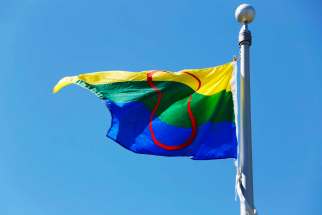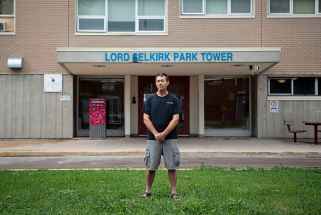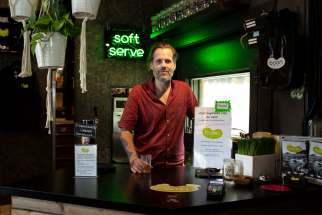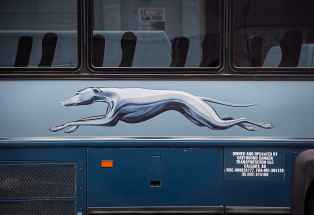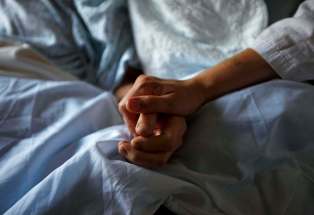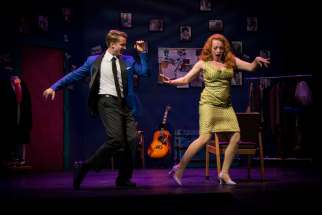Witness to an assisted death 'a compassionate beginning to the mystery of the eternal'
Read this article for free:
or
Already have an account? Log in here »
To continue reading, please subscribe:
Monthly Digital Subscription
$0 for the first 4 weeks*
- Enjoy unlimited reading on winnipegfreepress.com
- Read the E-Edition, our digital replica newspaper
- Access News Break, our award-winning app
- Play interactive puzzles
*No charge for 4 weeks then price increases to the regular rate of $19.00 plus GST every four weeks. Offer available to new and qualified returning subscribers only. Cancel any time.
Monthly Digital Subscription
$4.75/week*
- Enjoy unlimited reading on winnipegfreepress.com
- Read the E-Edition, our digital replica newspaper
- Access News Break, our award-winning app
- Play interactive puzzles
*Billed as $19 plus GST every four weeks. Cancel any time.
To continue reading, please subscribe:
Add Free Press access to your Brandon Sun subscription for only an additional
$1 for the first 4 weeks*
*Your next subscription payment will increase by $1.00 and you will be charged $16.99 plus GST for four weeks. After four weeks, your payment will increase to $23.99 plus GST every four weeks.
Read unlimited articles for free today:
or
Already have an account? Log in here »
Hey there, time traveller!
This article was published 13/07/2018 (2705 days ago), so information in it may no longer be current.
It all began with a request. A friend had contacted another friend to ask if she knew of a minister who could accompany her mother during her terminal illness.
So I was contacted.
The mother was in her mid-80s and she had been diagnosed with terminal cancer about six months earlier. She was a religious woman and as she aged and churches closed, she had lost contact with her own church community.
When I first met her, she told me that she was “already past her due date.” According to the doctors, she should have been dead. But here she was, still alive, but as she put it, “not alive and well.” During that first visit, I felt somewhat like I was being auditioned to see if I able to be up to this task — did I have the qualifications? Given that she fell asleep during that first visit, I figured she would write me off.
I tried not to crowd her and her family. After a couple of weeks, her daughter called again to say her mom wanted me to visit again if I could.
“I don’t want to leave you and I don’t want to stay. The physical pain is under control, but the emotional pain of seeing nothing ahead except more of this, more wasting, more sleepless nights, more tasteless meals, more just waiting for ending… none of us needs this.”
At this stage, I don’t think any of us, including “Mom,” knew where this was leading. She was moved again, shifted from one hospice to another because apparently she simply was not going to die on schedule. I met all of her children and they were awesome in their care of their mom. Visits, room decorations, time away from the hospice, meals in and outside; as Mom put it, “They can’t do enough.”
My phone rang one day and I saw that her daughter was calling me. I assumed Mom’s condition had worsened or that she might have died. By this time, her mom and I were comfortable with each other, often talking about faith and all that gives us love. When I heard the daughter’s words, I was both shocked and awed at the same time. Her daughter said her mom had met with the province’s MAID (medical assistance in dying) team and they had accepted and approved her request. In 2015, Ottawa passed a bill to make this medical assistance in dying legal. In Manitoba, members of the MAID team provide the service.
Mom wanted me to meet with her and her family just to be sure that we all agreed and understood what this meant. So we met. I have been present at other assisted deaths, but never in such a consciously prepared setting. I talked first with Mom alone, then with her adult children, then all together. The honest, caring, courageous love was so real in all these settings. No one wants a loved one to die. No one wants a loved one to suffer. Mom made it clear to her children.
“I don’t want to leave you and I don’t want to stay. The physical pain is under control, but the emotional pain of seeing nothing ahead except more of this, more wasting, more sleepless nights, more tasteless meals, more just waiting for ending… none of us needs this. You all did this with your dad. We know what it’s like. I would like to leave with myself still here!”
The whole family agreed that it was Mom’s choice, and they would be with her no matter what she choose. She claimed her time in the final days. She participated in dignity therapy, leaving a legacy of her story for children. She met again with the MAID team. She talked to extended family. After another two weeks or so, her daughter called me once more. “Mom would like you to come Tuesday afternoon, she has chosen 4 p.m. to die.”
I immediately went to see her. I was able to see a woman who was truly wrapped in anticipation. In all of our visits, she had never been a mushy kind of woman. She had always had an incredible sense of humour and dignity. That day, she asked me to facilitate her religious ending in faith. She asked if I could manage the Apostles Creed, the Lord’s Prayer and communion. “Traditions die hard,” she said, “but I won’t, they will help me.” I assured her I could, and she said, “The rest is up to you… be you!” She reached out to hug me and I was able to hold her face in my hands, tell her how much I admired her. She quipped back, “Good thing I stopped falling asleep, it was never you, just those drugs they do to you.”
There was a smile on Mom’s face and she was relaxed now… all the muscles unclenched.
Then came the day of death. It was warm, bright and beautiful. When I arrived, the family was all there and had been for an hour or so. One daughter had spent the night. The two daughters took her out to lunch. Mom was dressed in a lovely loose white pantsuit and colourful blouse. Favourite family foods and drinks were on the table. It was a party. Nothing like any dying and death room I had ever been in. We moved to what I now call the “sacred circle” around 3 p.m. I put on a clergy scarf as I began to honour her traditional roots. “I knew you could look the part!” she quipped. We did the traditional parts of her requests, moving around the circle with a shared cup. Her two daughters were musical and sang her favourite hymn and songs, then each person (the group was small, only nine of us, by invitation only) offered Mom their gift of words and she was able to share hers, and then at that moment there was a gentle knock on the door and the MAID team arrived — a doctor, two nurse specialists. They quietly joined the circle as we finished. It was 4 p.m. exactly. Mom words were, “They’re on time… wonderful!”
I have worked in health care and I need to say that I have never seen a more compassionate and caring team of medical professionals. They knew, each of them, this was indeed a sacred time of transition; like birth to life, so it is, life to death.
They followed the required protocol. Mom could change her mind right up until the very last moment and they assured her of that right. They explained separately to Mom and to the family how the injection process would work and they took all the time needed to pause for questions. I knew this would be the approach and I had asked Mom if she thought she might change her mind. Her eyes sparkled as she said, “Not a chance.”
So we gathered. Mom decided to settle on the bed, instead of the large chair, saying she didn’t want to “fall off and scare anyone. Besides, it looks more dignified to be lying down.”
One of the nurses put an IV in each arm. Again, Mom quipped, “Oh I get it, just in case one plugs up.” For me, it was like a sacrament of death. The team unrolled the three injections, just as one handles sacred objects, in a holy setting. The entire team was one their knees around her bed. Mom’s two sons were holding hands sitting by her head, and her two daughters were massaging and holding her feet; they, too, were on their knees, the rest of us stood back in reverence and I could feel the love. The team had explained that the first injection made you sleepy and relaxed, the second paralyzed and the third stopped the heart and lungs.
I have seen many people die in the career I chose for life, but never have I seen such a compassionate beginning to the mystery of the eternal.
In the sleepy stage, Mom spoke saying, “Well, I am not dead yet.” Then she said some private motherly words to her older son, and whispered, or maybe I just thought this… “Thanks.” A few moments later, the doctor stood, moved around the bed, checked her heart and said, “There is no sound.” There was a smile on Mom’s face and she was relaxed now… all the muscles unclenched.
And of course, it was not over and done. There were tears and hugs, and more touch and more words, but they were tears often of joy and words of thanks and gratitude for a life well-lived and well-died, for life as we share it and death as we share it.
In retrospect, it was such a privilege to be asked to be part of this very private, dignified, thoughtful, caring death. I have seen many people die in the career I chose for life, but never have I seen such a compassionate beginning to the mystery of the eternal. No tubes, no machines, no wasted withering, no agonizing waiting for it to be over and the awful realization that you just prayed for someone you love to die! Yes, there is still and always will be the grief of loss, which is how we learn to do the depth of love. I truly believe that no one in that room that day will feel that they gave up on Mom’s life. Instead, Mom gave them the gift of her physical end and her eternal courageous love. We will all die. This mortal body passes. How we make that passage, in the best of circumstances, how we die is entirely up to each of us.
Karen E. Toole worked for six years at Health Sciences Centre as instructor of spiritual diversity and as a spiritual health-care provider. After that, she went on to become the provincial co-ordinator of spiritual health care. She has been retired from this position since 2012.

